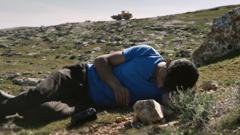The documentary "No Other Land," nominated for both an Oscar and a Bafta, reveals the struggles of a Palestinian community in the West Bank facing displacement and violence, underscored by the friendship of its filmmakers.
Oscar-Nominated Documentary Highlights Struggles in the West Bank

Oscar-Nominated Documentary Highlights Struggles in the West Bank
"No Other Land" captures the friendship and plight of a Palestinian and Israeli amid escalating tensions in the West Bank.
In the West Bank, where deep-rooted tensions often overshadow human relationships, a poignant story is unfolding. The Oscar-nominated documentary "No Other Land" chronicles the lives of Basel Adra, a Palestinian, and Yuval Abraham, an Israeli journalist, as they navigate their friendship against the backdrop of political strife and personal loss. Their film reveals the heartbreaking consequences of Israeli military actions on the Masafer Yatta community—a cluster of villages where ongoing conflict threatens the residents' existence.
For years, Basel and Yuval have documented the demolition of homes, schools, and basic infrastructure under the pretext of illegal construction. Their dedication culminated in a film that not only exposes injustice but also articulates the complex, often painful dynamics of their friendship. While their dream is to influence change, Yuval admits to the unsettling truth: "I don’t have an illusion that films are going to change the world, but I know they can change individuals."
The documentary offers a stark portrayal of the realities faced by the villages of Masafer Yatta. As the film unveils scenes of despair—bulldozers demolishing homes and families left without shelter—it also delivers glimpses into the resilience of its inhabitants, highlighting their unwavering hope for a just resolution. One heartbreaking moment captures a mother comforting her child, saying softly, "Tomorrow will be a new day."
Tensions have escalated dramatically in recent months, with violent incidents surging as the Israeli-Palestinian conflict intensifies. The UN reported a marked increase in settler-related violence, with numerous Palestinians killed and whole communities living in fear. Despite these challenges, both Basel and Yuval remain steadfast in their commitment to raise awareness and foster dialogue through their film.
Throughout the documentary, themes of identity and privilege emerge. While Yuval can traverse borders relatively unencumbered, Basel's movement is severely restricted. This inherent power imbalance serves as a constant reminder of the larger geopolitical landscape, prompting poignant introspection from both filmmakers. They grapple with guilt, responsibility, and the broader implications of their friendship amid such deep-seated conflict.
Despite the global recognition and acclaim that "No Other Land" has garnered, including a self-distribution effort in the US due to a lack of formal distribution channels, both Basel and Yuval strive to keep the focus on the people rather than the accolades. They view their project as a tool for empathy, one that interlaces personal stories with political narratives in an effort to inspire change.
As they continue their work, Basel finds solace in the support of his community, asserting, "One water drop doesn't make change... but keep dropping the water and it will make change." The enduring message of their film echoes through its frames: the personal and the political are irrevocably linked, and every story told is a step toward a larger movement for justice and equality.






















